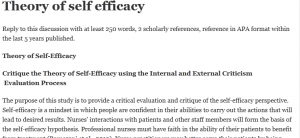Theory of self efficacy

Reply to this discussion with at least 250 words, 2 scholarly references, reference in APA format within the last 5 years published.
Theory of Self-Efficacy
Critique the Theory of Self-Efficacy using the Internal and External Criticism Evaluation Process
The purpose of this study is to provide a critical evaluation and critique of the self-efficacy perspective. Self-efficacy is a mindset in which people are confident in their abilities to carry out the actions that will lead to desired results. Nurses’ interactions with patients and other staff members will form the basis of the self-efficacy hypothesis. Professional nurses must have faith in the ability of their patients to benefit from treatment (Ramezani et al., 2019). Nurse practitioners may better serve their patients by being abreast of the latest developments in best practices in the healthcare industry. As a result, nurses may find it challenging to engage with patients who have developed less trust in their medical treatment plans. Dialysis patients are the ones who will need the most attention. Considering that they would have to endure dialysis for the rest of their lives, some patients lose hope. The non-compliance of certain patients is a severe issue in treating chronic conditions. Patients worry they will not have the strength to endure the dialysis treatment.
According to the external critique on the issue, psychological processes are required to forecast changes in behavior connected with a lack of belief in what one can do to improve one’s health outcomes. Cognitive behavioral theory (CBT) is helpful for nurses in dealing with patients who do not adhere to dialysis therapy. CBT successfully modifies patients’ desired behaviors (Sekhon et al., 2018). Self-efficacy theory, which has its roots in CBT, has been widely used across various nursing contexts, most notably in treating chronic conditions. Convergence shows that those who question their talents are more likely to give up when faced with difficulties. At the same time, those who are more confident in their abilities will make the necessary efforts to accomplish their goals despite any obstacles.
This insight is grounded in truth, as it explains why so many highly successful people share accounts of the hardships they overcame on their path to success. However, effectiveness varies widely from person to person (Karimy et al., 2018). The principle of self-efficacy is a powerful tool for nurses because it allows them to tailor their treatment to each patient based on their strengths and weaknesses. The theory’s applicability is enhanced by its specificity to the nursing field. However, the approach has several flaws, such as the impracticality of distinguishing between result expectation and effectiveness expectation. Without considering the ensuing anticipation, defining self-efficacy is challenging. That is why it is crucial to describe the theory in terms of the outcomes and benefits that people might reasonably anticipate. Self-efficacy theory is also heavily influenced by the context in which people find themselves. As a result, effective treatment techniques cannot be created without first comprehending the impact on the environment.